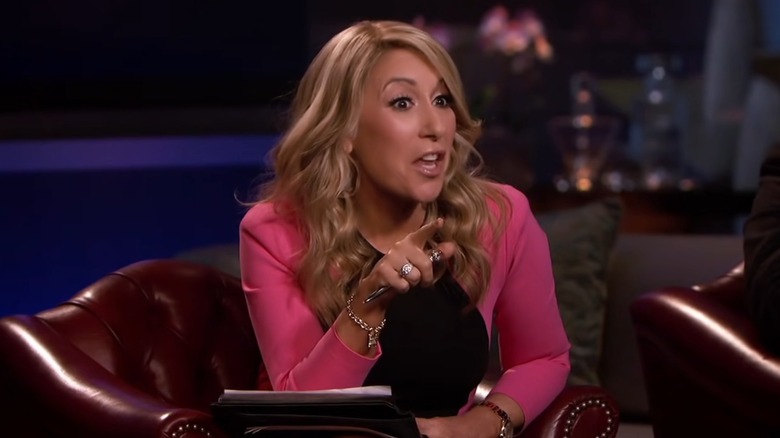Whatever Happened To Windcatcher After Shark Tank?
While some of the entrepreneurs who appear on "Shark Tank" have to practically beg for an investment from the series' panel of Sharks, sometimes a product comes along that is so brilliant it forces the sharks to fight for a stake in the company. Such was the case in Season 7, Episode 4, when entrepreneur Ryan Frayne presented his company Windcatcher Technology and piqued the interest of all five sharks on the panel.
The Windcatcher "Quickstream Inflation" device allowed inflatable objects to be blown up quickly and easily without an air pump, and Frayne demonstrated this to the sharks by blowing up a Windcatcher Air Pad in just two breaths. Frayne went on to explain that he didn't have a background in engineering, but had simply been trying to invent useful products for some time. After a trip to the beach forced him to blow up some tedious inflatable objects, Frayne went home and figured out a way to inflate a similar object instantly. Frayne did so by placing a small amount of space between the inflation valve and the object itself.
Researching this discovery led him to develop the Quickstream Inflation technology that serves as the basis for Windcatcher. At the time of this episode, Frayne had already made $165,000 in sales and had profit margins of 60% while selling to retailers.
What happened to Windcatcher on Shark Tank?
Ryan Frayne concluded his pitch for Windcatcher by answering a variety of questions from the sharks, explaining that he wanted to establish his own business while also licensing the quick-inflation technology for other products sold outside of the Windcatcher brand. The sharks were heavily impressed by the demonstration, with Kevin O'Leary, in particular, saying it could disrupt the entire air mattress industry. The sharks quickly began a vicious bidding war to see who could acquire a piece of Windcatcher Technology.
After some initial offers didn't meet Frayne's standards, venture capitalist Mark Cuban was the first to match Frayne's original ask of $200,000 for 8% equity in the company — additionally offering a $10 million credit backup for Windcatcher's purchase orders. Not wanting Cuban to run away with the lead offer, shark Robert Herjavec offered the same deal plus the credit backup for just 6.5% equity. Kevin O'Leary then revised his initial offer, dropping all the way down to $200,000 for just 1% equity, but requiring a royalty of 6% until he profited $800,000 from their deal.
Lori Greiner eventually won Frayne over with an offer of $200,000 for 5% in the company, in addition to the $10 million credit backup Frayne was asking for. Greiner made this shocking offer after dropping guest shark Chris Sacca from the negotiations, further proving just how invested she was in this particular product.
Windcatcher after Shark Tank
It's not often that we see a product evoke such a competitive series of bids from the "Shark Tank" panel, and for Ryan Frayne to earn a better deal than his initial ask proves just how impressive his pitch truly was. Many fans who watched this bidding war must have expected big things for Windcatcher — Frayne among them.
Shortly after the Windcatcher episode of "Shark Tank" hit the air, Frayne actually flew to his manufacturer in China to make sure they would have enough stock for all of the success that the so-called "Shark Tank Effect" would bring in. The incredible optimism surrounding Windcatcher came crashing down just a few weeks later, when Frayne discovered that the outdoor recreation company Cascade Designs sold a product that was incredibly similar to the Windcatcher. A 2018 report from Inc. claims that Frayne had a previous relationship with the Cascade but had never closed a deal with the company, despite the similarities in their two products.
A subsequent legal battle with Cascade (in which Frayne countersued for breach of a nondisclosure agreement and trade dress infringement) shattered Frayne's deal with Lori Greiner, resulting in a major setback for Windcatcher. This unprecedented legal battle was only one of the many challenges that plagued Frayne after "Shark Tank," as he was tragically diagnosed with terminal pancreatic and liver cancer around the same time.
Why did Windcatcher go out of business?
Despite his cancer diagnosis and the immense legal battle he was facing, Ryan Frayne did not back down from the challenges ahead –- rallying his friends and family to fight for Windcatcher's success, knowing that the company would likely outlive him.
The aforementioned report from Inc. claims that Frayne's childhood friend Oren Hanson helped run Windcatcher while Franye was undergoing chemotherapy treatment, becoming the company's Chief Operating Officer while Frayne turned his attention to the creative arm of the business. Similarly, Frayne's mother and father helped out with bookkeeping and shipping for Windcatcher products. In 2016, the legal battle with Cascade Designs reached a settlement, which Franye says included a license for Cascade Designs. "It's much easier, if it's a licensing-based company, for someone to take it over," Frayne explained to Inc. "They don't really need me to be involved."
Frayne tragically passed away in 2018 after a lengthy battle with cancer, and it's currently unclear how much success Windcatcher had after their transition to being a licensing-based company. In any case, it seems that Windcatcher Technology no longer exists— with the company website having shut down in 2022, and their social media being inactive since around 2019. The tragic fall of Windcatcher is undoubtedly one of the most heartbreaking stories to come out of "Shark Tank," particularly because of the immense potential Frayne displayed during his brief appearance on the show.



